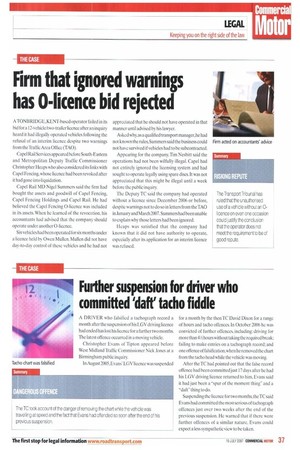Firm that ignored warnings has 0-licence bid rejected
Page 37

If you've noticed an error in this article please click here to report it so we can fix it.
A TONBRIDG E, KENT-based operator failed in its bid for a 12-vehicle/two-trailer licence after an inquiry heard it had illegally operated vehicles following the refusal of an interim licence despite two warnings from theTraffic Area Office (TAO).
Capel Rail Services appeared before South-Eastern and Metropolitan Deputy Traffic Commissioner Christopher Heaps who also considered its links with Ca pel Fencing, whose licence had been revoked after it had gone into liquidation.
Capel Rail MD Nigel Summers said the firm had bought the assets and goodwill of Capel Fencing, Capel Fencing Holdings and Capel Rail. He had believed the Capel Fencing 0-licence was included in its assets. When he learned of the revocation, his accountants had advised that the company should operate under another 0-licence.
Six vehicles had been operated for six months under a licence held by Owen Mullen. Mullen did not have day-to-day control of these vehicles and he had not appreciated that he should not have operated in that manner until advised by his lawyer.
Asked why, as a qualified transport manager,he had not known the rules,Summers said the business could not have survived if vehicles had to be subcontracted.
Appearing for the company, Tim Nesbitt said the operations had not been wilfully illegal. Capel had not entirely ignored the licensing system and had sought to operate legally using spare discs. It was not appreciated that this might be illegal until a week before the public inquiry.
The Deputy TC said the company had operated without a licence since December 2006 or before, despite warnings not to do so in letters from the TAO in January and March 2007. Summers had been unable to explain why those letters had been ignored.
Heaps was satisfied that the company had known that it did not have authority to operate, especially after its application for an interim licence was refused.


























































































































































































